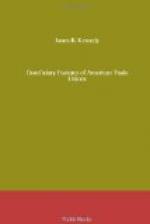[Footnote 218: Constitution of the Iron Molders’ Union of North America, 1902 (Cincinnati, n. d.), p. 20; Constitution of the International Typographical Union of North America, 1904 (Indianapolis, 1904) p. 10.]
[Footnote 219: Proceedings of the Twenty-second Session, Toronto, 1902, p. 646 (Supplement to Iron Molders’ Journal, September, 1902).]
[Footnote 220: Proceedings of the Forty-sixth Session, Milwaukee, 1900, pp. 51, 99 (Supplement to Typographical Journal, September, 1900).]
[Footnote 221: The Carpenter, Vol. 16, October, 1896.]
Efficient financial administration requires in the case of certain benefits an apportionment of revenue between the national union and its subordinate unions. The funds for the payment of death and disability benefits or of old age pensions can be held at national headquarters, since the administration of such benefits can be centralized and immediate payment is not essential. In the railway unions and in the great number of unions, such as the Brotherhood of Carpenters and the Typographical Union, which have developed only death benefits, the dues for beneficiary purposes are collected by the local unions and paid over to the national treasury. In those national unions which have introduced sick, out-of-work, or travelling benefits, national funds are ordinarily held by the local unions, for the reason that it is desirable that payment of claims should be made immediately. The unions which pay such benefits are divisible into two classes according to the extent to which they have entrusted the funds of the national union to the local unions. The Cigar Makers, the Typographia, the Piano and Organ Workers and the Plumbers intrust to the local unions all the funds of the national organization. A more numerous class of unions apportion the dues between the local unions and the national organization. The Iron Molders, for example, collect twenty-five cents per week from every member. This amount is applied as follows: ten cents per week per member is transferred to the International treasurer, of which sixteen per cent. is placed to the credit of the death and disability fund, twenty-six per cent. to the monthly fund, and fifty-eight per cent. to the strike fund; eight cents per week per member is held by the local unions as a credit to the benefit fund out of which are paid sick and out-of-work benefits; and the remainder, seven cents per member, is held by the local unions as a fund for local expenditures.
The adjudication of claims is naturally the most important administrative task connected with a system of benefits. In all cases the national officials rely upon the local unions and their officers for a certain amount of cooeperation and aid in preventing fraud, but the amount of this dependence varies with the character of the benefit. In death and disability benefits the national union can prevent fraud almost without any cooeperation on the part of the local unions.




